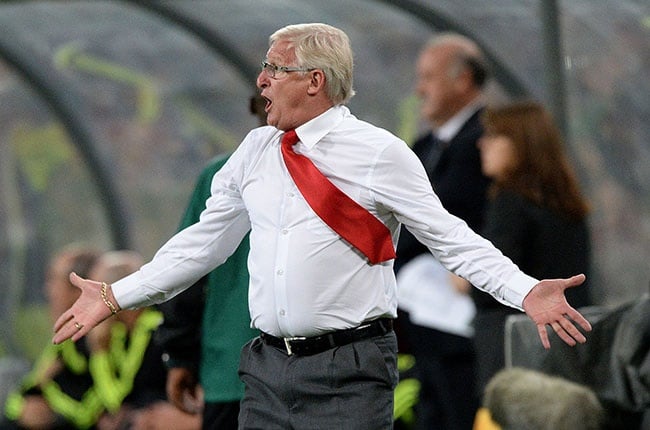


Coach Gordon Igesund reacts during the international friendly match between South Africa and Spain at Soccer City Stadium 19 November 2013 in Johannesburg, South Africa (Photo by Duif du Toit/Gallo Images)
- Bafana Bafana pivoted from one ignominious failure to another in the decade after the 2010 FIFA World Cup.
- The optimism that came along after beating France for the first time, and Ghana soon after, dissipated a year later following the “Dance of Shame” in Mbombela.
- South Africa had four full-time coaches in just 10 years, all of whom left the post in sensationally calamitous fashion.
- Bafana have not been part of a FIFA World Cup tournament since 2010.
Bafana Bafana beat France for the first time at the tournament and, although they were the first hosts to crash out in the group stages of a Soccer World Cup, they left 2010 with a greater feeling of optimism.
They did most things right: the right coach was appointed, Pitso Mosimane, who was Carlos Alberto Parreira’s assistant, and they beat African powerhouse Ghana in a friendly straight after the tournament.
Succession. When last did you hear that in word in the South African football vocabulary?
Decades of the South African Football Association (SAFA) haphazardly hiring and firing coaches were stemmed by the simplest and most obvious appointment – at, what seemed then, the right time.
In 2011, Bafana beat Egypt in Johannesburg for the first time in a competitive match, thanks to Katlego “Killer” Mphela’s finish at the death. They seemed destined for Gabon and Equatorial Guinea, but a typical South African crossroads was quickly met.
Mosimane’s “gotcha moment” came in the now infamous draw to Sierra Leone in Mbombela – the ignominious failure to qualify for the 2012 African Nations Cup (Afcon). That moment alone set the tone for the rest of the decade: dancing in defeat.
The football media tore Mosimane and SAFA apart.
SAFA, to their shame, bent to press pressure and forced the now successful Mamelodi Sundowns coach out. Hindsight tells us that might have been a hasty decision.
The organisation flip-flopped from one failed appointment to another thereafter, while Mosimane grew from strength to strength, taking Sundowns, not Bafana, to the African summit.
The Gordon Igesund years followed. And although South Africa performed admirably as stand-in 2013 Afcon hosts, after going out to Mali in the quarter-finals in Durban, his tenure, too, ended in shame.
Bafana failed to qualify for the 2014 Soccer World Cup in Brazil, or any other since 2010 (where they qualified automatically as hosts), after losing out to Group A winners Ethiopia. Names such as Saladin Said, Getaneh Kebede and Addis Hintsa were pretty foreign until Bafana made them famous by falling to the Walya Antelopes.
But the hammer in Igesund’s coffin came in January 2014, during an innocuous, some might say “freebee”, African Nations Championship (CHAN) tournament at home. Bafana conspired to crash out in the first round and their captain, Itumeleng Khune, accused the coach of trying to influence the players to demand bigger bonuses.
Igesund denied those allegations – but, whatever the truth of that matter, SAFA was sparred the expense.
Then sports minister Fikile Mbalula branded the team “a bunch of losers” after they bombed out in the group stages, leaving the rest of the country to suffer through a tournament of African-based unknowns.
The country moseyed along, through the highs of qualifying for the 2015 Afcon under Shakes Mashaba and the lows of finishing stone last in that competition’s pool stages, before he, too, was abruptly shown the door when South Africa didn’t make it to the 2017 edition. That he was fired during the qualifying rounds for Russia 2018 was vintage SAFA.
The old way was back. It harked back to the firings of Clive Barker, who qualified South Africa for France 1998, and Carlos Queiroz, who booked SA’s ticket to Japan and South Korea in 2002. Neither of the two coaches managed to steer the team in those major competitions.
By the time Stuart Baxter took over, his ready-made excuse for the inevitable failure to qualify for Russia was that he took the reins mid-qualifying, with the dubious replay against Senegal in Polokwane that ended in a 2-0 loss.
As per the trend, Baxter resigned last year, despite an admirable performance at Afcon, where his charges knocked out hosts Egypt and pushed Nigeria close. By then, the 2010 feel-good factor had long dissipated.
It beggars belief how all that optimism was thrown away, both by the public and people who should know better, the association running the game.
The players who were meant to shine the way for a bigger, brighter Bafana future – Mphela, Siphiwe Tshabalala, Khune, Bernard Parker and Teko Modise – dominated the domestic scene, but didn’t quite live up to the post-2010 promise.

